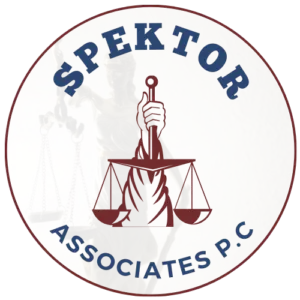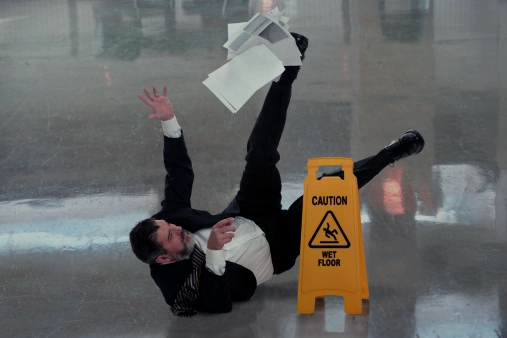Slip-and-fall accidents can occur in homes, businesses, or government buildings. The building liability laws state that property owners can be held financially liable for any damage caused to their property. These accidents can result from a spill or a leaking roof that has made the ground slippery.
Slip and fall accidents can also be caused by tripping over loose carpets, extension cords, damaged floors, thresholds, or stairs. In addition, slip-and-fall accidents can result from icy conditions on a sidewalk or parking lot if the property owner has not adequately warned others of the hazard. Owners are responsible for all areas of their property, not just the interior design.
If you or someone you care about has been hurt on someone else’s property because of the owner’s carelessness, contact a lawyer in your area right away to talk about your case.
What Is the Definition of a Slip and Fall?
A slip-and-fall accident is a type of personal injury case that falls under the jurisdiction of civil liability. In these cases, one party slips and falls, and is injured on the other party’s property. These accidents can occur on private, commercial, or government property. Some injuries sustained in a slip-and-fall accident may be minor, such as bruises or sprained ankles. In other cases, these accidents can lead to more severe injuries, such as spinal cord or head injuries. These wounds have the potential to result in lifelong problems like paralysis and irreparable brain damage.
Parties Who May Be Held Accountable For A Slip-and-Fall Accident
Depending on the slip-and-fall accident, you can hold different parties responsible for the resulting damages. However, the parties most commonly responsible for these incidents include:
In a commercial establishment, you slipped and fell.
Typically, slip-and-fall accidents in a store result from wet floors, slippery floor surfaces, crumbling walkways, or debris in aisles. To hold the store responsible for a slip-and-fall accident caused by these unsafe conditions, the store owner must have known about the dangers and not done anything to fix them or warn customers about them. The unsafe condition must have caused injury and damage.
Therefore, to determine if you have a viable legal claim due to a slip and fall accident at a store or other commercial establishment, you should consult an experienced slip and fall attorney as soon as possible. These lawyers can look at your accident, figure out if you have a good case, and help you figure out who is to blame for your injuries and other damages.
You Came Across Someone Else
If you got hurt at a friend’s house because of a dangerous situation, you could file a claim with that friend’s homeowners insurance.
If your friend rents the property, the owner is generally responsible for obtaining premises liability insurance. Therefore, you can bring claims against your landlord.
However, the best way to determine your options is to discuss this situation with an experienced slip-and-fall accident lawyer, who can help you decide on your legal options and what you need to do to avoid getting your money back.
You slipped and fell on a public street.
If you fell on a public road, you cannot hold a state or municipal agency liable for the slip-and-fall accident on a street or sidewalk unless the agency was negligent and this negligence led to your accident. Instead, it should show that the area was unreasonably dangerous and that the community knew, or reasonably should have known, of the hazardous situation.
Also, depending on the state where the accident occurred, there may be other regulations you must follow before you can hold a municipality or government agency responsible for your injuries. For these reasons, discussing your accident with an experienced slip-and-fall lawyer is advisable. These lawyers can confirm whether you can file a complaint against the government and how to proceed.
You slipped and fell on the driveway of a neighbor.
All it takes is one step down a slippery path or driveway, and you can rack up several injuries and expensive medical bills. But if the accident happened on the neighbor’s property, can you hold them responsible for the damage?
Property owners are obligated to keep their property safe from others. As a result, you may hold your neighbors responsible for the injuries caused by accidents. Home insurance can cover most of these accidents.
Fortunately, work with a qualified slip and fall attorney. These attorneys can help you determine whether you can hold your neighbor responsible for your injuries and what compensation you can claim.
You slipped and fell in a store.
Many things can cause you to trip or slip and fall in a retail environment. Dirt in aisles, the corner of a storage shelf, and wet floors are all things that happen in retail stores. The manager or employee should warn of unsafe conditions, such as wet floors that someone has just cleaned or driveways covered in rain, snow, or sleet.
However, just because there is a sign doesn’t mean you can’t claim damages from the retail establishment. After a slip and fall, you should always talk to a lawyer and have someone who knows the law tell you if you have a case.
You trip and fall at a friend’s house.
Have you ever been to a friend’s house and tripped over a non-standard step or the edge of a carpet that kicked up due to heavy traffic? You could be injured if you hit your head while falling or hit your body while falling.
Even though your friend is to blame for your injuries, you’ll likely be able to settle the bill with his or her homeowners’ insurance.
You slipped and fell in broad daylight.
Public sidewalks can pose many hazards, primarily if the community does not maintain them. Cracks and raised or uneven walkways can cause tripping. Unploughed and snow-cleared sidewalks can lead to slipping.
Because not all communities have the same rules, depending on where you live, the following people may be liable for injuries caused by icy and snowy sidewalks, the owner, the landlord, or the tenant of a building. Some communities require residents to clean the public sidewalks in front of their homes. However, if someone is disabled, works all day, or can’t go out to clean the sidewalk, who’s to blame? An experienced slip-and-fall attorney will examine your case to determine whom you should re-use.
You Slipped and Fell in Your Own House
You could trip, slip, or fall even in your own home. But who is responsible? Were you the carefree type who abandoned something? Or was it a bug on the house floor? You can make a personal injury claim with your home insurance, depending on the cause of your trip or slip and fall.
Liability Issues in Slip and Fall Accidents
A serious fall from a great height or onto a hard surface can cause serious injury or even death to the victims. Suppose a property owner’s negligence becomes the cause of a severe fall accident involving a guest. In that case, the person who was at fault for the accident and was hurt may try to get paid for all the costs and damages caused by the accident.
Civil Liability: Negligence
Regardless of whether the fall accident occurred in a private home, public space, or commercial property, if the premises are unreasonably dangerous, the property owners may be liable under the Construction Liability Act. Most slip-and-fall accident cases are settled due to negligence.
Strict Liability for Slips and Falls
Sometimes a slip accident can be a dangerous event, in which case plaintiffs do not have to prove that the defendant was negligent or reckless. Strict liability applies in principle if building safety regulations are violated and an aggrieved tenant demands compensation from the landlord. In tough liability cases, the degree of harm is paramount, as it determines the amount of payment to which the plaintiff is entitled.
Some slip-and-fall accident questions and answers are provided below.
How Long Do You Have To File A Lawsuit After A Slip And Fall?
Another problem people face after a slip-and-fall accident is when they file a legal claim. According to the statute of limitations, the victims of an accident have a term to present their legal acts. People must make their claim within this period to claim compensation for the damages they suffered from the accident. Exceptions to this rule may apply. So, discuss your accident with an experienced slip and fall attorney as soon as possible. Your lawyer can set the maximum time limit to present your legal case. It also helps ensure that your filings, records, and documents are completed correctly and submitted to the competent court before the deadline.
Should You Sue For A Slip And Fall?
First, before filing a slip-and-fall claim, you need to decide if it’s worth it. Filing a claim with your homeowner’s insurance company can be difficult, especially when vital issues are contentious or difficult to resolve, including the landlord’s fault for the slip and fall accident, the nature and extent of your injuries, the legality of the medical treatment you received, and the non-economic effects of your injuries.
How Much Could Your Slip-and-Fall Suitcase Be Worth?
This is one of the most frequently asked questions by victims of slips and falls. Still, unfortunately, a reliable answer can only be given after a careful analysis of the specific case. However, there are certain factors that tend to carry more weight in terms of determining the potential value of a slip-and-fall claim such as the clarity of the error problem, the severity of the plaintiff’s injuries, and the availability of sufficient liability insurance to cover the applicant’s losses.
Has the owner been informed of the danger?
Owners are entitled to a reasonable time to discover unsafe conditions. Notification is one of the hardest things to prove in a slip-and-fall case. If a store or company has a fall, the company will likely later file an incident report. Incident reports often identify the cause of an accident on a commercial property. They can provide insight into how long a property owner was aware of an unsafe condition that led to a fall. Surveillance video from the area where the fall occurred could show how much time was allowed to elapse after the dangerous situation arose. Accident reports and surveillance videos are often vital evidence to prove that a property owner was (or should have been) informed of a hazardous condition.
Was a warning displayed?
In general, if a homeowner is aware of a dangerous condition and cannot fix the problem immediately, they should warn others of the danger. For example, if a public sidewalk is being built, the community where the sidewalk is located must warn people of the construction risks through signage, designated areas, etc. Or a shopkeeper should warn people that freshly washed floors are slippery by putting up warning cones.
Why Should You Hire An Attorney For Slip And Fall Accidents?
Gregory Spektor & Associates P.C. provides excellent slip-and-fall accident case representation services in Queens, NY. Our experienced attorneys are highly skilled and dedicated to providing you with quality services in personal injury claims, fall injury claims, spinal cord injuries, and fall cases. We have offered slip-and-fall case services for over six years and have mastered the best techniques for quality work in the industry.
Our company charges fair and affordable prices for slip-and-fall cases. We will offer you a free consultation or advice with questions related to medical costs, fall injuries, and personal injury claims. Contact us today, and let us be responsible for your slip and fall accident cases.


